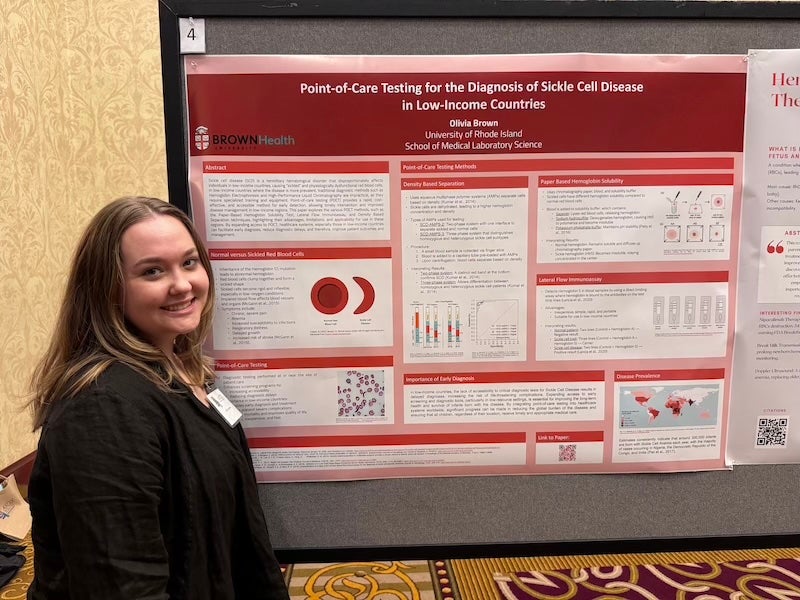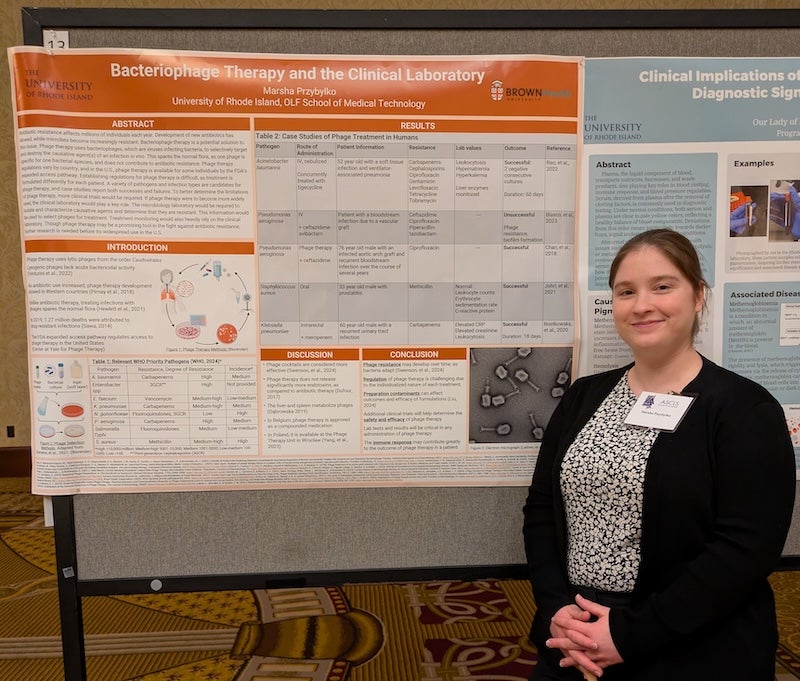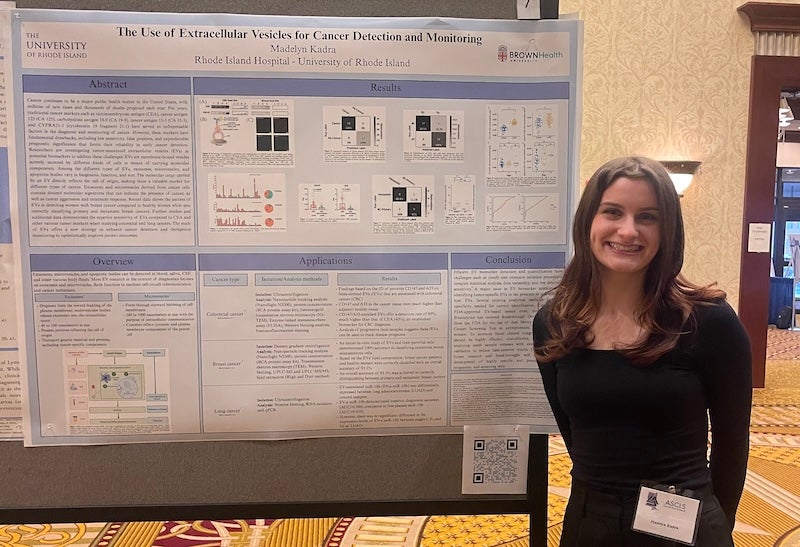Three students majoring in medical laboratory science (MLS) recently won awards for research posters presented at the American Society for Clinical Laboratory Science – Central New England conference held in Warwick, RI.
Madelyn Kadra, a senior from Milford, MA, won first place in the student poster competition for her poster on using extracellular vesicles (EVs), special kinds of cellular structures, for cancer detection and monitoring. Traditional cancer markers used for diagnosis have fundamental drawbacks, and Kadra’s research contributes to a growing body of work exploring EVs as potential biomarkers to address these challenges. The ultimate goal of this work is to inform a new strategy for cancer detection and therapeutic monitoring to improve patient outcomes.
“This program has prepared me extremely well for my future career,” she says. “I am walking away with numerous hours of real laboratory experience and countless connections with laboratory staff and management. I’m more than confident that this experience will help ease my transition from college into the working world.” Kadra plans to work in a clinical hospital lab and potentially continue her education as a hematologist.

Olivia Brown, a senior from Richmond, RI, won second place for her poster highlighting the point-of-care diagnostic techniques for the diagnosis of sickle cell disease (SCD) in low-income countries. Traditional diagnostic methods for SCD, a hereditary hematological disorder, are impractical in low-income countries where people are disproportionately affected because they require specialized training and equipment. Brown’s work explored alternate methods for early detection with the goal of facilitating early diagnosis and improving patient outcomes and management.
“Being an MLS major has been incredibly rewarding,” Brown says. “I just completed my 11-month clinical internship, which gave me invaluable hands-on experience and really helped prepare me for the field. Along the way, I’ve had the opportunity to work with and learn from so many amazing technologists who have inspired and mentored me.” After graduation later this month, Brown will work at South County Hospital as a medical laboratory scientist.

Marsha Przybylko, a senior from North Smithfield, RI, won third place for her poster about bacteriophage therapy (the use of small viruses called bacteriophage) to treat antibiotic-resistant infections. “Over time, antibiotic-resistant infections have grown more prevalent and severe,” she says. “However, discovery of new antibiotics is costly and time-consuming, which led me to research bacteriophage therapy as a possible solution.
Przybylko’s work focused on how the potential implementation of bacteriophage therapy would affect the clinical laboratory, how bacteriophage therapy works, and what lab tests should be run for patients undergoing phage therapy. “A key element of my poster was a summary of relevant case reports about the use of bacteriophage therapy around the world, which highlighted both the challenges and benefits associated with phage therapy,” she says. Przybylko will soon begin a full-time position as a medical laboratory scientist working in clinical chemistry, hematology, and the blood bank.
The major
URI’s medical laboratory science major prepares students for applied careers in the medical laboratory, biomedical, and public health industries. Medical laboratory science is a vital component of the healthcare system that utilizes laboratory-based tests to assist in the diagnosis, treatment, and monitoring of disease. Medical laboratory scientists are trained to perform, analyze and interpret a wide variety of tests to provide information about diseases such as diabetes, cancer and infections as well as screen blood and blood products for transfusions.
“I’ve always wanted to work in healthcare, but I didn’t necessarily want to be patient-facing,” Kadra says. “Majoring in MLS and becoming a certified lab scientist allows me to impact patient care without physically seeing patients.” She points to the small size of the major as positively shaping her experience. “One of the many highlights of being an MLS major here at URI is the community that we’ve created,” Kadra says. “My educational path felt personal and individualized, and our graduating class feels almost like a family.”
Przybylko echoes Kadra’s enthusiasm for the strong foundation in medical laboratory science she received at URI. “I was able to explore my interest in research and help share my passion for science as a tutor. I believe that these things will make me a well-rounded and capable medical laboratory scientist, says. “The MLS clinical internship was also a major highlight of the program. The hands-on clinical experience was invaluable and allowed me to experience every area of the clinical laboratory, from blood banking to molecular diagnostics.”

